Medical specialties are often surrounded by stereotypes that can sometimes be humorous but rarely reflect the full truth. Let us take a closer look at some common medical specialty stereotypes and get ourselves a much-needed reality-check.
Why discuss it in the first place? It’s because, surprisingly, many medical students pick a medical specialty based on these wrong assumptions. And it’s not just the students, other people also start showing prejudices based on these stereotypes.
In a Cambridge Medicine Journal study, medical students were asked about the first adjective that comes to their minds regarding different specialties. For example, when asked about surgeons, some wrote, “arrogant”, while others wrote “skillful”.
You will be familiar with some of the stereotypes discussed in this post. And some will be absolutely new for you. Anyways, let’s see what’s really going on behind the scenes in these diverse fields of medicine.
1). Anesthesiologists are always lazy and hate CRNAs.
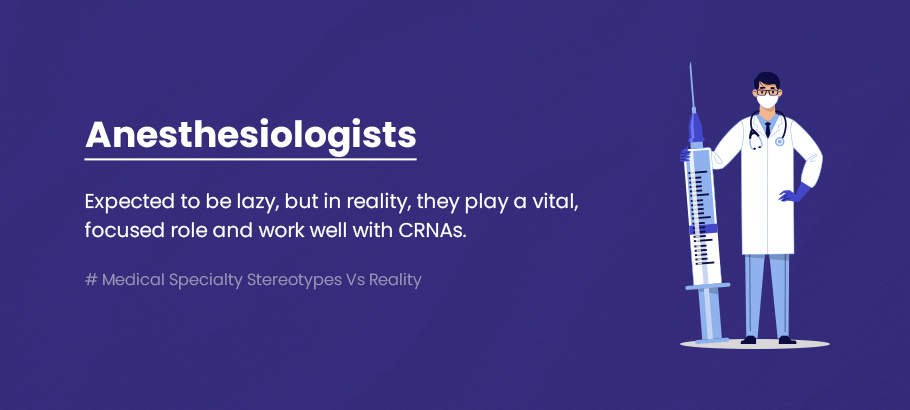
Specialty Stereotype:
Anesthesiologists are often seen as sitting idly behind a large machine in the operating room while the surgeons do all the heavy lifting. Other words used by the medical students are lazy, aloof, chilled, bored, sleepy, and more.
Personality Reality:
The stereotype about this medical specialty is wrong, and is solely based on superficial observation. Anesthesiologists aren’t idle or lazy. Let us explain.
Anesthesiologists play a crucial role in any surgery. They’re responsible for managing the patient’s anesthesia, which involves a lot more than just flipping a switch. They monitor vital signs, adjust anesthesia levels, and ensure the patient is comfortable throughout the procedure.
Their work is critical and requires intense focus and quick action. If something goes wrong, they’re the first to respond, making sure the patient remains stable. So, if they seem calm or look idle to you, it means everything is going good.
And what about the stereotype that says Anesthesiologists hate CNRAs?
Well, here’s the reality:
Vast majority of anesthesiologists and CNRAs don’t hate each other, they work well together. We’ve seen more friendly interactions than the unfriendly ones. Some political lobbying groups may be the reason behind this stereotype about CNRAs and anesthesiologists because of overlapping scope of practice and similar jobs.
But fact is; anesthesiologists and anesthetists have different jobs to do. While there may be times when they don’t work collaboratively enough, they work together just fine.
2). Surgeons are arrogant and bossy.
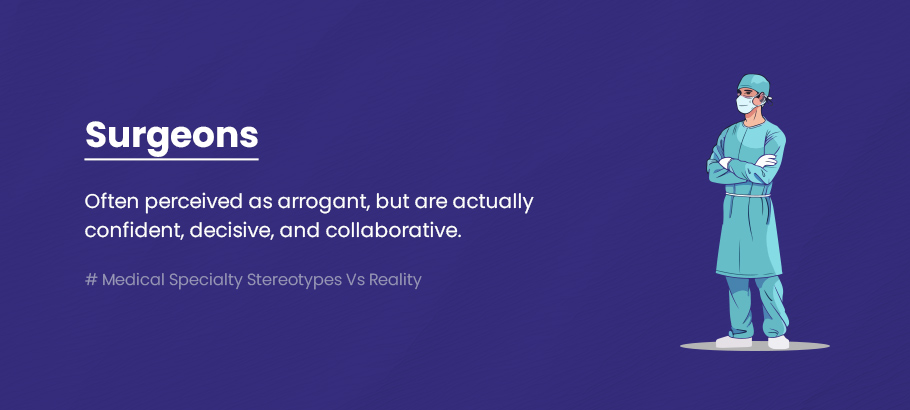
Specialty Stereotype:
Surgeons often get a bad reputation for being arrogant and bossy, always yelling at their subordinates in the operating room. The stereotype suggests they’re the high-and-mighty leaders of the operating room, taking all the credit.
Other words used to describe surgeons by the medical students are loud, scary, strict, skillful, precise, egotistical, and more.
Personality Reality:
While it’s true that surgeons must be confident and decisive, they’re also skilled at working as part of a team. Successful surgeons know that their job involves more than just taking charge. They must communicate effectively with anesthesiologists, nurses, and other team members to ensure the surgery goes well.
Leadership in surgery is about collaboration and respect, not just authority. The best surgeons lead with both skill and empathy, understanding that teamwork is key to successful outcomes. So, no, most surgeons are not bossy at all.
3). Pediatricians are fun, childish, and tired.
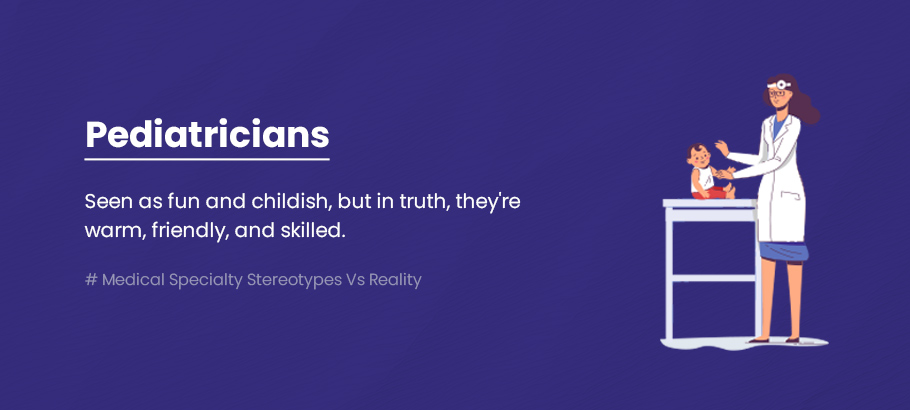
Specialty Stereotype:
While the general avatar of pediatricians is good, caring, friendly, kind, and patient. But even the medical specialty of pediatrics has its negative stereotypes.
Personality Reality:
Pediatricians are often seen as exceptionally warm and friendly, always putting kids at ease with their kind nature. They’re thought of as the “too nice” doctors who make trips to the clinic less scary for young patients.
And this medical specialty stereotype about pediatricians is generally true. They are known for their ability to connect with children. But remember that their role is much more than just being friendly or nice.
Pediatricians undergo extensive training to manage health issues, from common illnesses to complex medical conditions. So, they aren’t childish or just fun, they are serious doctors, treating your kids with compassionate healthcare.
4). Psychiatrists are strange people who love corduroy.
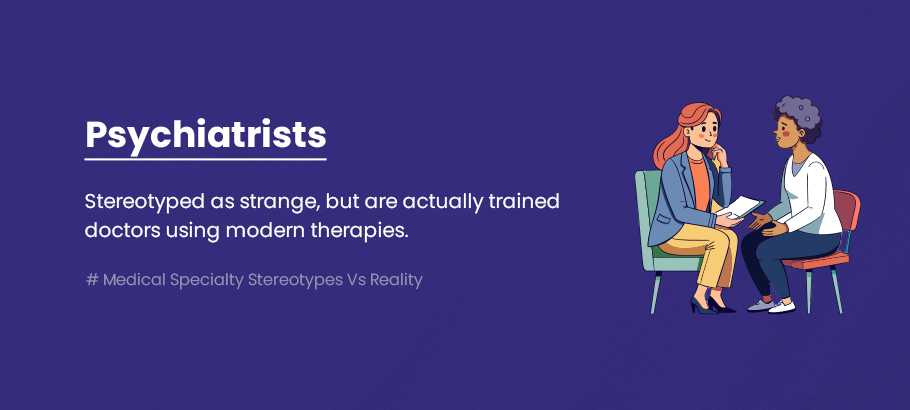
Specialty Stereotype:
There’s an outdated medical specialty stereotype that psychiatrists are strange, out of touch people who love wearing old-fashioned corduroy suits. This image can make their profession seem odd. In the past, psychiatrists were also believed to have magical insights into the human soul or psyche.
Personality Reality:
In reality, psychiatrists are highly trained medical doctors who specialize in mental health. They use modern therapies and medications to treat mental health issues, including depression, anxiety, and bipolar disorder.
Their work is crucial and up-to-date, focusing on improving patients’ mental well-being with the latest advancements in the field. The strange personality and the corduroy suit stereotypes don’t reflect the true, dynamic nature of psychiatric care today.
5). Orthopedics is for “bros” only.
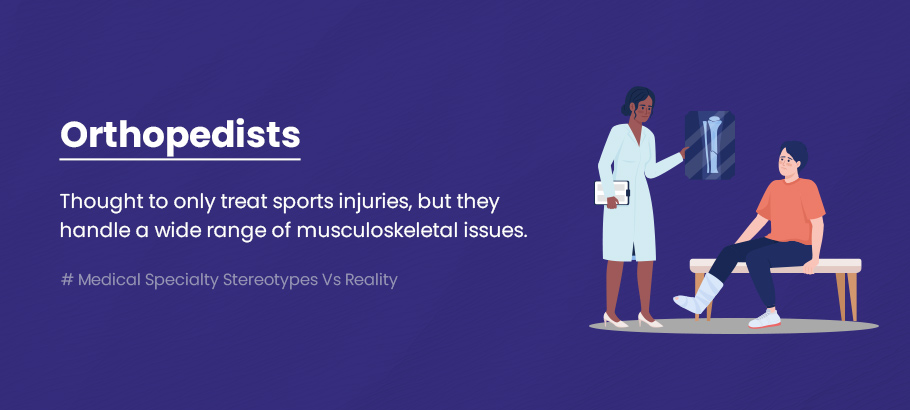
Specialty Stereotype:
Orthopedists are sometimes labeled as “bros” due to their association with sports injuries. This medical stereotype suggests they’re mainly focused on treating athletic injuries and have a laid-back attitude.
Personality Reality:
Although orthopedists frequently deal with sports-related injuries, their expertise extends far beyond that. They handle diverse musculoskeletal issues, including fractures, joint disorders, and spinal conditions.
Orthopedists are highly skilled and knowledgeable to address these diverse problems. Their role involves both surgical and non-surgical treatments, and they work with patients from all walks of life, not just athletes. You will be surprised to discover the volume of information an orthopedic surgeon has. They’re not just bros!
6). Pathologists are introverts or “just the lab guys”.
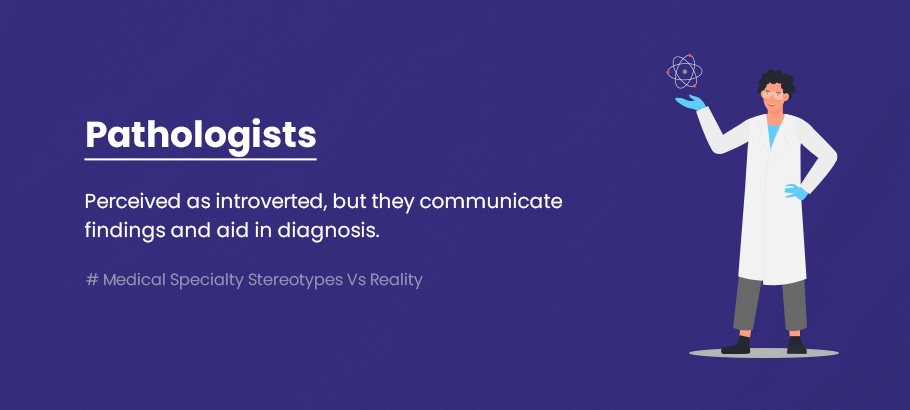
Specialty Stereotype:
Pathologists are wrongfully perceived as introverted and socially awkward. They are “just the lab guys” who do nothing other than just performing some tests. This stereotype suggests they’re not as involved in patient care.
These are the words some medical students used for pathologists: boring, nerdy, anti-social, busy, tired, lab-rat, lonely, and more.
In a study done by the Royal College of Pathologists, most respondents believed that pathologists didn’t like people and that they got into pathology just because of that.
Personality Reality:
Sometimes, medical specialty stereotypes give us goosebumps because of the coldly bold stance. This one about pathologists is absolutely wrong! Most pathologists are as social as most people in our society are! They are healthcare providers who run tests and analyze lab samples to diagnose diseases.
So while much of their work takes place in a lab, it’s far from solitary. They frequently communicate their findings to other doctors to help guide patient treatment. In fact, effective communication is a big part of their role to ensure accurate diagnoses and appropriate care plans.
7). Family medicine doctors are the friendliest.
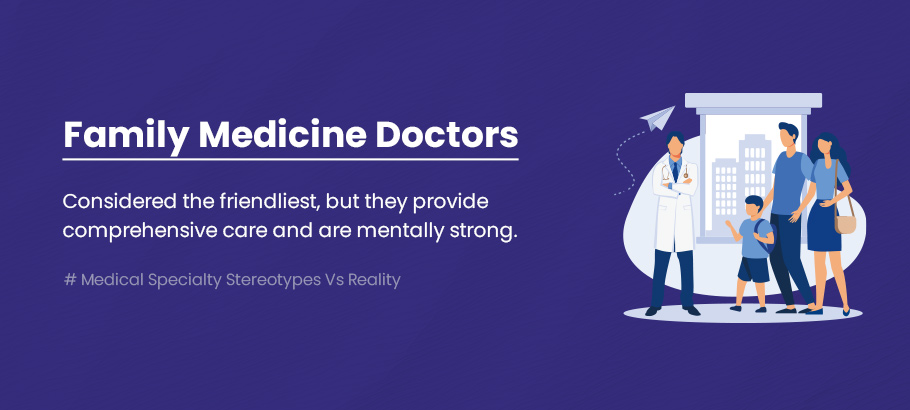
Specialty Stereotype:
Family medicine doctors are often viewed as the friendliest doctors, known for their ability to build strong, long-term relationships with patients. They’re seen as the neighborhood doctors who really get to know their patients.
This stereotype looks good from outside, right? You’re right, but some people also believe medical students choose family medicine because they “aren’t strong enough.” Now, that’s not positively good!
Personality Reality:
While family medicine doctors are indeed friendly and approachable, their role involves a lot more than just being nice. They provide comprehensive care for health issues, from preventive care to chronic disease management. Their job requires a broad knowledge base and the ability to handle diverse medical needs.
Building relationships with patients is important, but it’s only one part of their complex and demanding role. So, they are not just friendly, they are strong as well.
8). Emergency Medicine (EM) doctors are cowboys and always stressed.
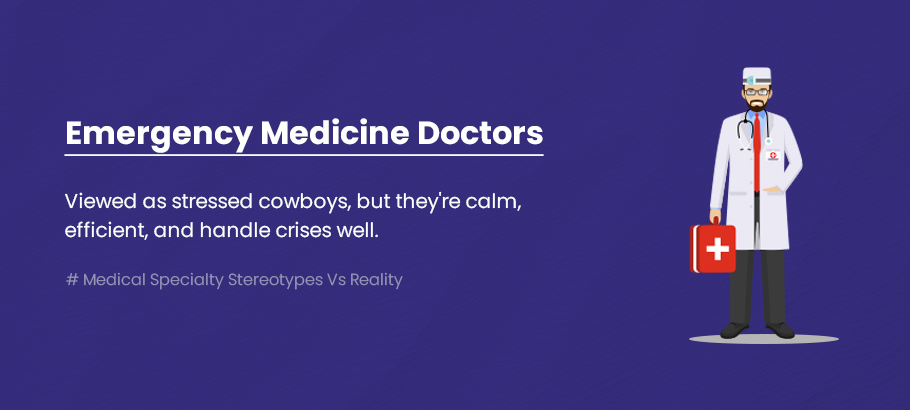
Specialty Stereotype:
Emergency medicine doctors are often thought to be constantly stressed. They’re the “cowboys,” always dealing with high-pressure situations in emergency rooms. The image is that they’re always on edge, struggling to keep up with the demands of their job without much regard for safety.
Personality Reality:
Yes, EM healthcare providers are stressed at times, but not always. And the “cowboy” image doesn’t quite fit.
EM doctors do work in a high-pressure environment, but they are highly trained to handle these situations with calm and efficiency. They are good at making quick, critical decisions and managing a wide range of emergencies. Their ability to manage crises with precision and calm is a testament to their expertise and resilience.
9). Internal medicine doctors are dorky.
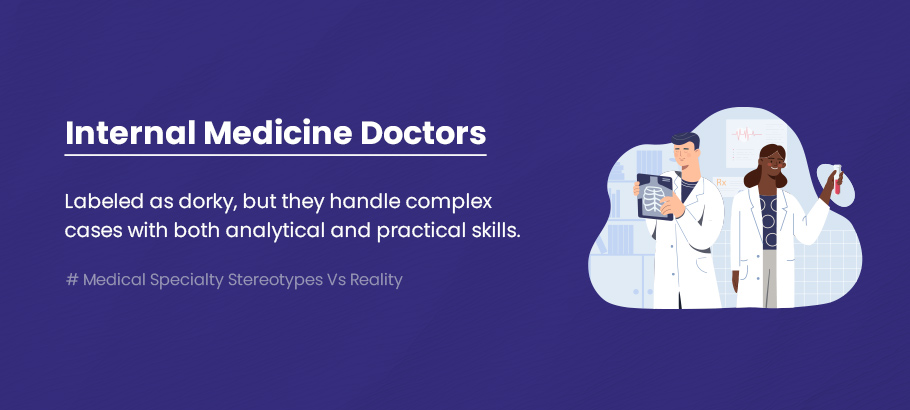
Specialty Stereotype:
Internal medicine doctors sometimes get labeled as “dorky” because they’re seen as more interested in discussing medical problems than in performing hands-on procedures. The stereotype suggests they’re more about theory than practice.
Personality Reality:
Internists handle some of the most complex medical cases, often involving multiple conditions or chronic diseases. Their work includes both inpatient and outpatient care, requiring a deep understanding of various medical issues.
They are skilled in diagnosing and managing intricate health problems, balancing both analytical thinking and practical care. Their job involves both detailed problem-solving and direct patient interaction, making them crucial to overall patient management.
So, no, they are not dorky or clueless at all! They know what they do, and they offer practical care as well.
10). Dermatologists are money-motivated and lazy.
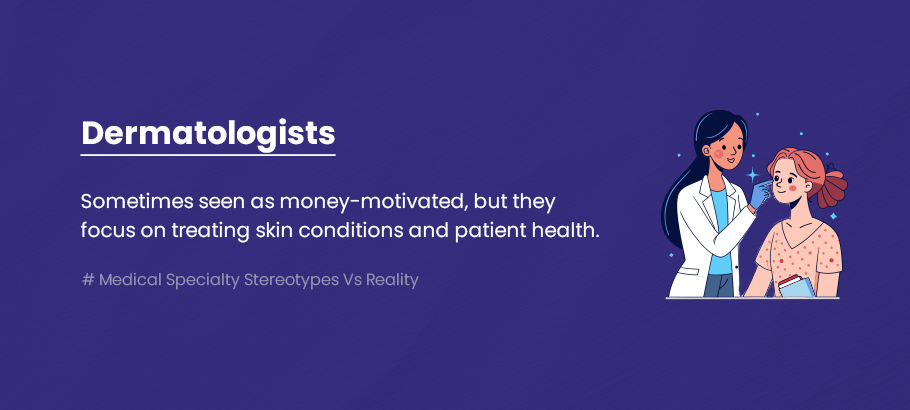
Specialty Stereotype:
Dermatologists are sometimes seen as primarily motivated by financial gain in their medical specialty. The stereotype suggests that because dermatology can be a lucrative field, dermatologists are more focused on making money than on patient care. And they are as lazy as pathologists, questioning their competence.
Personality Reality:
Although dermatology can be financially rewarding, it is also a field dedicated to important health care. Dermatologists treat a wide range of skin conditions, from acne to serious diseases like melanoma.
Their work involves crucial procedures and diagnostics, and their focus is on patient health and well-being. The field’s financial aspects are just one part of their profession, with patient care being the primary goal.
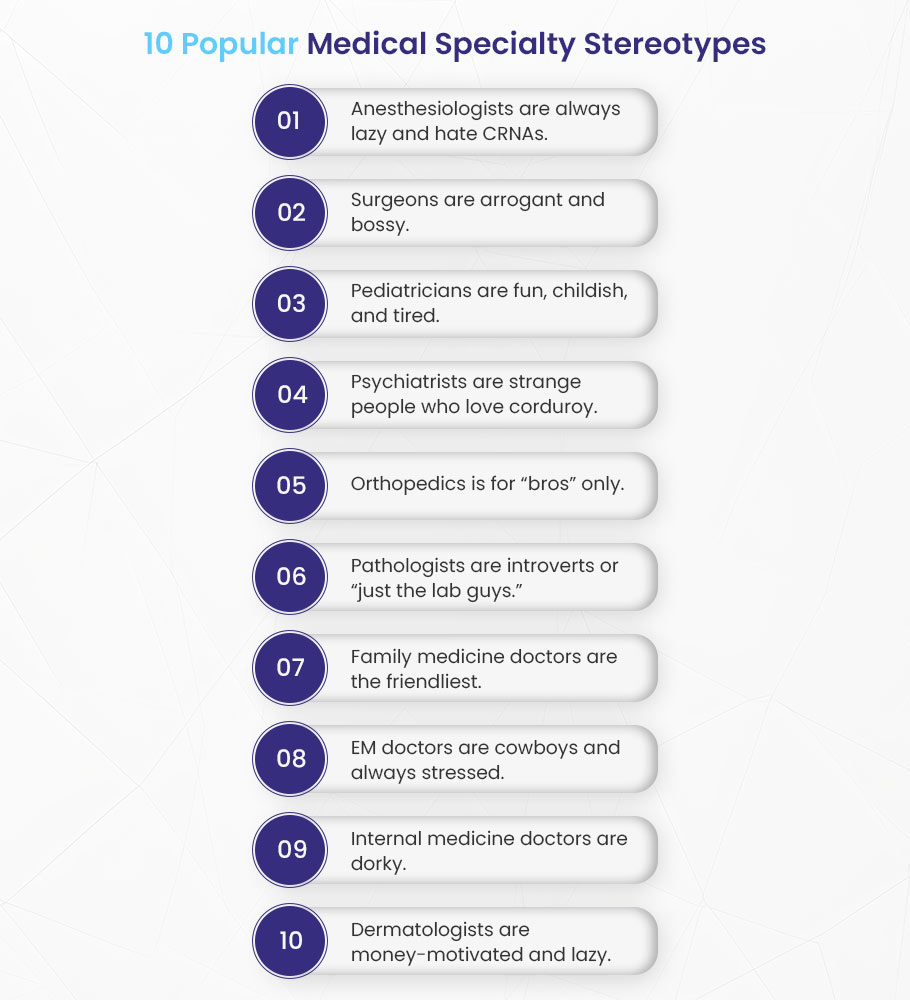
While stereotypes about medical specialties can be amusing, they often miss the complexity and dedication that professionals in these fields bring to their work. Having a reality-check helps us appreciate the contributions of each medical specialty.





